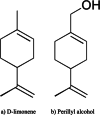Effect of d-limonene and its derivatives on breast cancer in human trials: a scoping review and narrative synthesis
- PMID: 34362338
- PMCID: PMC8349000
- DOI: 10.1186/s12885-021-08639-1
Effect of d-limonene and its derivatives on breast cancer in human trials: a scoping review and narrative synthesis
Abstract
Background: D-limonene and its derivatives have demonstrated potential chemopreventive and anticancer activity in preclinical and clinical studies. The aim of this scoping review was to assess and critically appraise current literature on the effect of these bioactive citrus peel compounds on breast cancer in human trials and to identify knowledge gaps for exploration in future studies.
Methods: This study followed a scoping review framework. Peer-reviewed journal articles were included if they reported the effect of d-limonene or its derivatives on breast cancer in human subjects. Articles were retrieved from academic databases - PubMed, EMBASE, CINAHL, Web of Science, and Cochrane reviews - and iteratively through review of bibliographies of relevant manuscripts. Titles and abstracts were appraised against the aforementioned inclusion criteria in a first round of screening. Through consensus meetings and full article review by authors, a final set of studies were selected. Results were reported according to the PRISMA extension for scoping reviews.
Results: Our search strategy yielded 367 records. Following screening and adjudication, five articles reporting on phase 1(n = 2), phase 2 (n = 2) and both trial phases (n = 1) were included as the final dataset for this review. Trials evaluating the effect of d-limonene (n = 2) showed it was well tolerated in subjects. One study (n = 43 participants) showed d-limonene concentrated in breast tissue (mean 41.3 μg/g tissue) and reduction in tumor cyclin D1 expression, which is associated with tumor proliferation arrest. This study did not show meaningful change in serum biomarkers associated with breast cancer, except for a statistically significant increase in insulin-like growth factor-1 (IGF-I) levels. While elevation of IGF-I is associated with increased cancer risk, the clinical implication of this study remains uncertain given its short duration. Trials with perillyl alcohol (n = 3) showed low tolerance and no effect on breast cancer.
Conclusion: This review demonstrated a dearth of clinical studies exploring the effect of d-limonene and its derivatives on breast cancer. Limited literature suggests d-limonene is safe and tolerable in human subjects compared to its derivative, perillyl alcohol. Our review demonstrates the need for additional well-powered placebo-controlled trials that assess d-limonene's efficacy on breast cancer compared to other therapies.
Keywords: Breast cancer; Chemopreventive; Citrus peel; D-limonene; Perillyl alcohol; Scoping review.
© 2021. The Author(s).
Conflict of interest statement
Authors declare they have no competing interest
Figures
References
Publication types
MeSH terms
Substances
LinkOut - more resources
Full Text Sources
Medical
Research Materials



